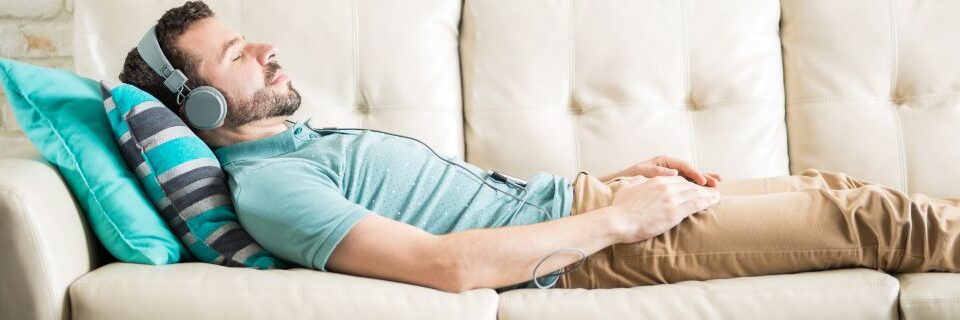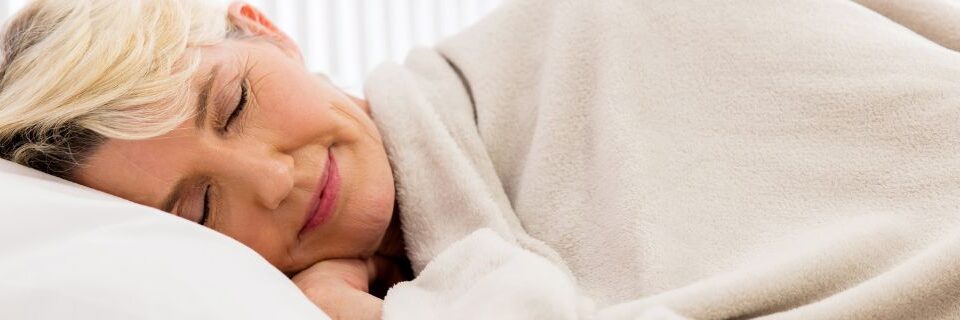
How To Get Rid of Sleep Anxiety and Insomnia: Your Guide To a Good Night’s Sleep

Sleep Better: 5 Secrets You Need to Get the Sleep You Need Tonight
Table of Contents
Along with a good diet, exercise and avoiding tobacco, high-quality rest is one of the most important ways to ensure you stay healthy. Here’s how to enjoy good sleep, get a full night’s rest and wake up feeling refreshed.
Get Some Sunlight
Exposing yourself to daylight will ensure you fall asleep faster, and it also helps you achieve the high-quality rest that keeps you healthy.
Your body runs on a natural cycle called the circadian rhythm. Also known as the dark-light cycle, it regulates behavior changes and physiology, including when you feel energetic and when you feel drowsy. Getting some light keeps you in tune with your circadian rhythms, and that helps you fall asleep naturally.
In a study of older people, researchers found that daily exposure to white light significantly improved their ability to fall asleep after just 12 days. Best of all, they got deep, high-quality rest. They woke up less often during the night, and they increased the amount of REM rest they got. These were all people who had experienced chronic sleeplessness for at least a year before entering the study.
In another study, bright light therapy helped people with dementia sleep better. They received two hours of bright light exposure a day for 14 days. Most reduced their nocturnal waking time by two hours, and all improved their ability to fall asleep.
How much sunlight should you get? Exposing yourself to just 30 minutes of daylight a day could improve your ability to fall asleep. If you can’t get outside, you can use a bright indoor light.
Don’t Nap – Sleep at night
A daytime nap can be very tempting, especially if you don’t sleep much at night. You’re exhausted, and your bed suddenly looks very inviting. If you have insomnia, however, that could be a bad idea.
That is because falling asleep in the daytime means you are less likely to do so at night. You’ve already had your rest, and your body will not want to do it all over again.
A 2011 study compared the effects of a nap on people who didn’t get enough rest. The participants were all healthy adults. They slept for just six hours, and then they were randomly assigned to “nap” or “wake” groups. The nap group took a 90-minute nap. The others went right to work. Results showed that people who napped were more drowsy and slower to work than those who didn’t nap.
That was probably because they took long naps. Another study found that naps of 30 minutes or less enhanced productivity, but longer naps had the opposite effect. Short naps promoted wakefulness and improved performance. Longer or more frequent naps, however, led to the loss of productivity and inertia.
What does this mean for you? For the best results, take just one nap, and make it 30 minutes or less. By combining short naps and our self-hypnosis for sleep, you can make the most of your nights.
Keep a Schedule
If you want to fall asleep and stay that way, one of the most important things you can do is keep a schedule. Try to fall asleep and wake up at the same time each day.
In an Italian study of adolescents, the teens who kept irregular sleep habits also scored high on daytime sleepiness, attention problems, poor school achievement and emotional troubles. They also consumed more caffeine and sedatives.
Take Herbal Supplements
Many supplements are promoted as therapies for sleep problems. Some popular ones include chamomile, lavender and valerian. The research on their effectiveness isn’t well-established, but there is one that has ample evidence to back it. Melatonin works well to help you fall asleep. It is also safe. It doesn’t have the negative side effects that prescription medications have.
Your body produces melatonin. This hormone tells your brain that it’s time to start slowing down and preparing for sleep. In one study, teens with childhood-onset insomnia took melatonin supplements for several years. The users improved their ability to fall asleep with no negative side effects.
Another study found melatonin allowed users to fall asleep quickly and feel more alert in the morning. It also had no withdrawal effects.
In some countries, you must get a prescription for melatonin supplements. In others, it is available over the counter as an herbal supplement.
Get the Rest You Need
These tips will help you fall asleep faster and wake up refreshed. You’ll feel better all over when your body is fully rested. And you can always complement your self-care routine with self-hypnosis audios.
If you follow all these tips and still need some help to fall asleep, you can use our deep sleep hypnosis audio download and enjoy a good night’s sleep.
UpNow Health only uses high-quality sources, including peer-reviewed articles, to support the facts within our articles. All our articles are reviewed by experts to ensure that our content is accurate, helpful, and trustworthy.
1. Vitaterna MH et al (2001): Overview of circadian rhythms. Aloohol Res. Health, 2001; 25(2): 85–93. Link at https://www.ncbi.nlm.nih.gov/pmc/articles/PMC6707128/.
2. Campbell SS, Dawson D and Anderson MW: Alleviation of smaintenance insomnia with timed exposure to bright light. J Am Geriatr Soc. 1993 Aug;41(8):829-36. Link at https://pubmed.ncbi.nlm.nih.gov/8340561/.
3. Fetveit A, Skjerve A and Bjorvatn B.: Bright light treatment improves rest in institutionalized elderly–an open trial. Int J Geriatr Psychiatry. 2003 Jun;18(6):520-6. doi: 10.1002/gps.852. PMID: 12789673.
4. Dhand, R., & Sohal, H. (2006): The role of daytime naps in healthy adults. Current opinion in pulmonary medicine, 12(6), 379-382.Link at https://pubmed.ncbi.nlm.nih.gov/17053484/
5. Groeger, J. et al (2011): Effects of inertia after daytime naps vary with executive load and time of day. Behavioral neuroscience, 125(2), 252. Link
6. Giannotti F et al: Circadian preference and daytime behavior in adolescence. J Res. 2002 Sep;11(3):191-9. Link at https://pubmed.ncbi.nlm.nih.gov/12220314/
7. Duffy JF et al: Relationship of endogenous circadian melatonin and temperature rhythms to self-reported preference for morning or evening activity in young and older people. J Investig Med. 1999 Mar;47(3):141-50. Link at https://pubmed.ncbi.nlm.nih.gov/10198570/
8. van Geijlswijk IM et al: Evaluation of puberty and mental health in children with long-term melatonin treatment for chronic idiopathic childhood onset insomnia. Psychopharmacology (Berl). 2011 Jul;216(1):111-20. Link at https://pubmed.ncbi.nlm.nih.gov/21340475/
9. Lemoine P, Nir T, Laudon M, Zisapel N: Prolonged-release melatonin improves quality and morning alertness in insomnia patients aged 55 years and older and has no withdrawal effects. J Res. 2007 Dec;16(4):372-80. Link at https://pubmed.ncbi.nlm.nih.gov/18036082/
10. Antoniades, Josefine, et al: A review of the efficacy of herbal remedies for managing insomnia. Alternative and complementary therapies 18.3 (2012): 136-140. Link.












